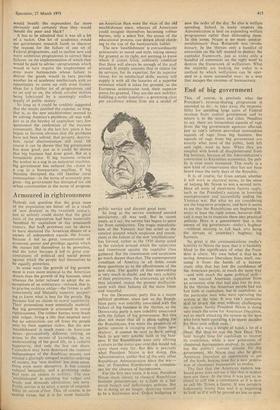Armoured in righteousness
Nobody can question that the great mass of the population are better off as a result of 'new dealism' in the twentieth century, just as nobody could doubt that the great mass of the population had been materially benefited by capitalism in the nineteenth century. But both processes can be shown to have shattered the American dream of a society of independent equals, the former because it led to great concentration of economic power and privilege against which the masses felt themselves to be powerless, and the latter because it led to great con- centrations of political and social power against which the people feel themselves to be equally powerless.
In some ways the growth of big govern- ment is even more inimical to the American dream than the growth of big business, since Whereas the latter refused to adopt the as- sumptions of an aristocracy—refused, that is, to practise noblesse oblige—the former is self- consciously and blatantly superior, purport- ing to know what is best for the people. Big business laid no claims to moral superiority. Their pretensions were essentially material. But big government is armoured in moral righteousness. The robber barons were brash and vulgar, living a life that inspired envy but no admiration, cut oft from the people only by their superior riches, But the new 'establishment' is much more—in American terms—provocatively different, relying on access to the secrets of knowledge, to an understanding of the good life, to a cultural superiority, that only the few can share. Capitalism may have destroyed the material independence of the Amefican masses, and created a glaringly unequal material ordering of society. but 'new dealism' has done some- thing even more disruptive. It has created cultural inequality, and a governing order that rests on claims to nobility. The new establishment' is anything but vulgar and brash, and demands admiration, not envy. Public service is its ideal, a sense of responsi- bility its raison crdtre. This, of course, is its central virtue, but it is far more basically un-American than were the vices of the old establishment since, whereas all Americans could imagine themselves becoming robber barons, only a select–few, the cream of the educational process, can dream about climb- ing to the top of the bureaucratic ladder.
The new 'establishment' is extraordinarily aristocratic in mood and style, taking money for granted as its right, not seeming to know where it comes from, sublimely confident that there will always be enough of the stuff around. It simply assumes that in return for its services, for its expertise, for its superior vision, for its intellectual skills, society will supply it with all the luxuries of a superior existence which it takes for granted, as the European aristocracies took their superior status for granted. They are the new nobility, fulfilling a noble function—a governing class par excellence whose lives are a model of
public service and discreet good taste.
So long as the service rendered seemed satisfactory, all was well. But in recent years, as I say, the service has begun to seem far from satisfactory. The tragic miscalcula- tion of the Vietnam war has acted as the catalyst around which suspicion and resent- ment at the failure of the new 'establishment' has formed, rather as the 1930 slump acted as the catalyst around which the suspicions and resentment against the capitalist class gathered. But the resentments and suspicions go much deeper than that. The contemporary condition of America in all fields raises deep questions as to the effectiveness of the new class. The quality of their stewardship is very much in doubt, and the very nobility of their pretensions, the aristocratic air which they adopted, makes the present disillusion- ment with their failures all the more bitter and resentful.
For the Democratic party this is a major political problem, since just as the Repub- lican party was indelibly associated.with the failure of big business in the 'thirties, so the Democratic party is now indelibly associated with the failure of big government. But this does not mean that all is plain sailing for the Republicans. For while the pendulum of public opinion is swinging away from 'new dealism', it cannot be said to have swung back to any very notable faith in big busi- ness. If the Republicans were only offering a return to the status quo ante this would not carry them very far. But this is precisely what President Nixon is not doing. His Administration, unlike that of the only other Republican Administration since the war— that of President Eisenhower—is conspicu- ous for the absence of businessmen.
For the first two years, it is true, President Nixon stuck closely to classical Republican business prescriptions; to a faith in a bal- anced budget and deflationary policies. But he is doing so no longer, declaring himself to be a Keynesian now. Deficit budgeting is
now the order of the day. So also is welfare spending. Indeed, in many respects his Administration is bent on expanding welfare programmes rather than disbanding them. In this sense, Nixon is no more counter- revolutionary than Roosevelt was revolt'. tionary. In the 'thirties only a handful of extremists on the left wanted to destroy the capitalist framework, just as today only a handful of extremists on the right want to destroy the framework of welfareism. What the majority are looking for today is a method by which welfareism can be oper- ated in a more successful way: in a way that escapes 'the excesses of bureaucracy.










































 Previous page
Previous page